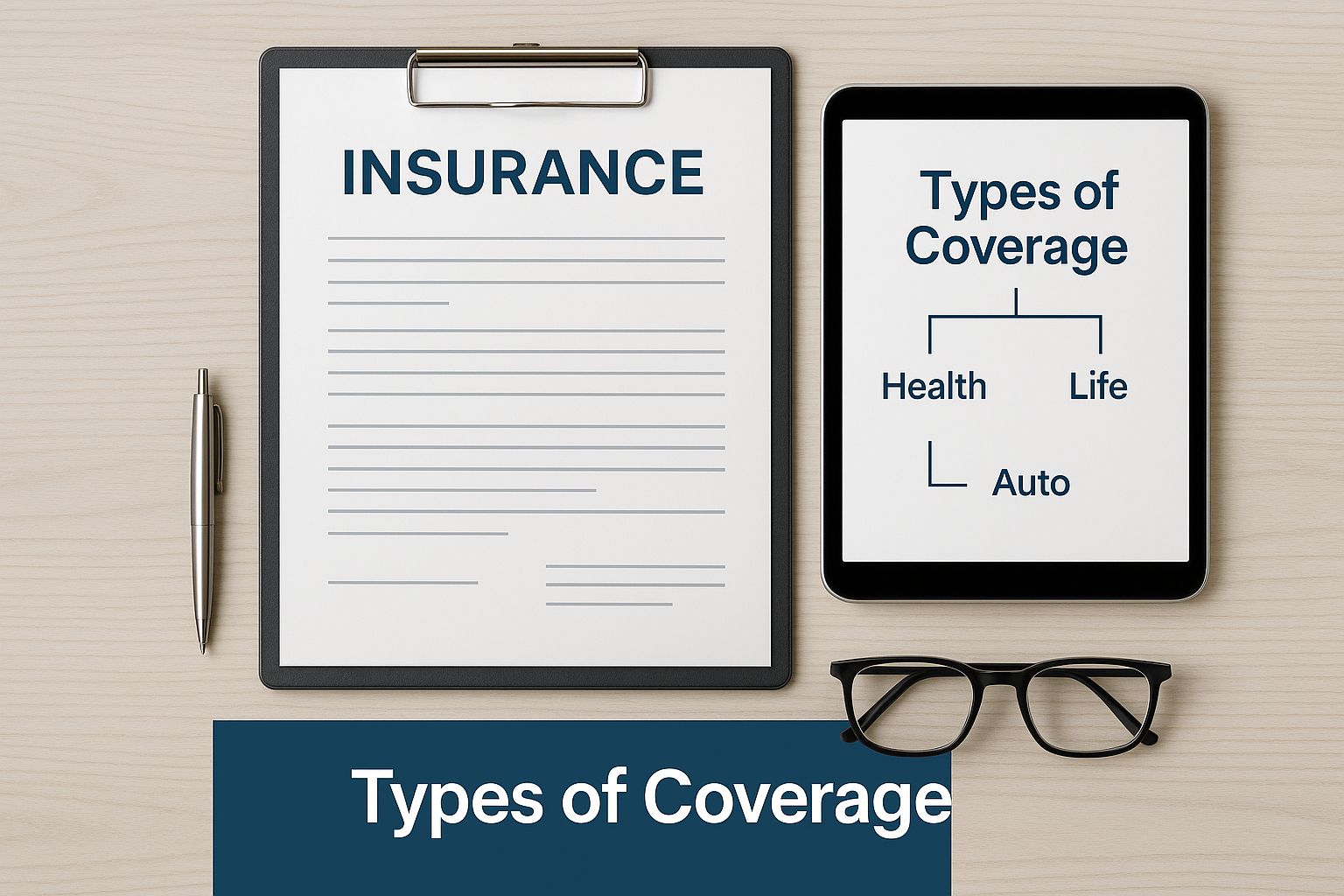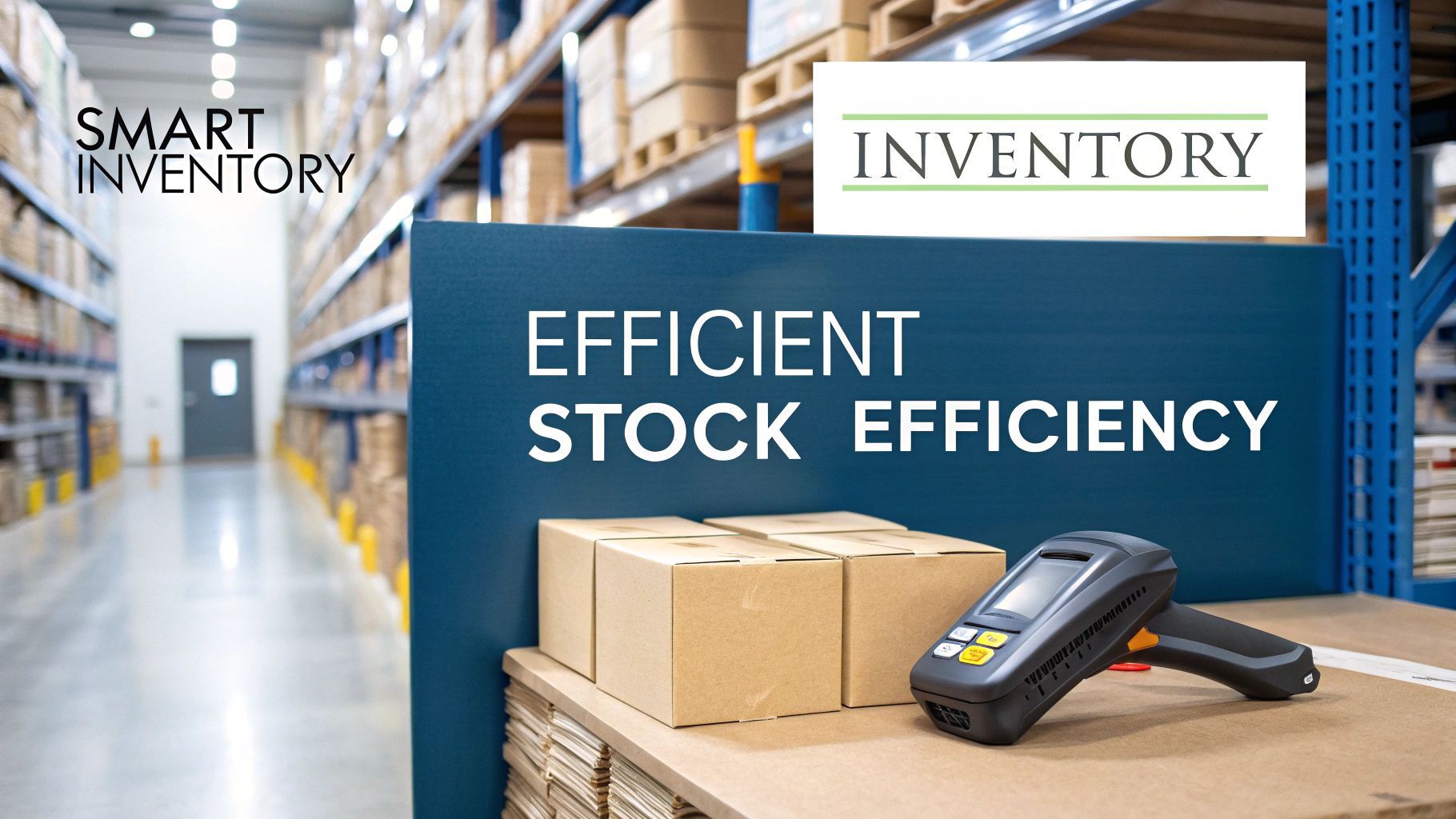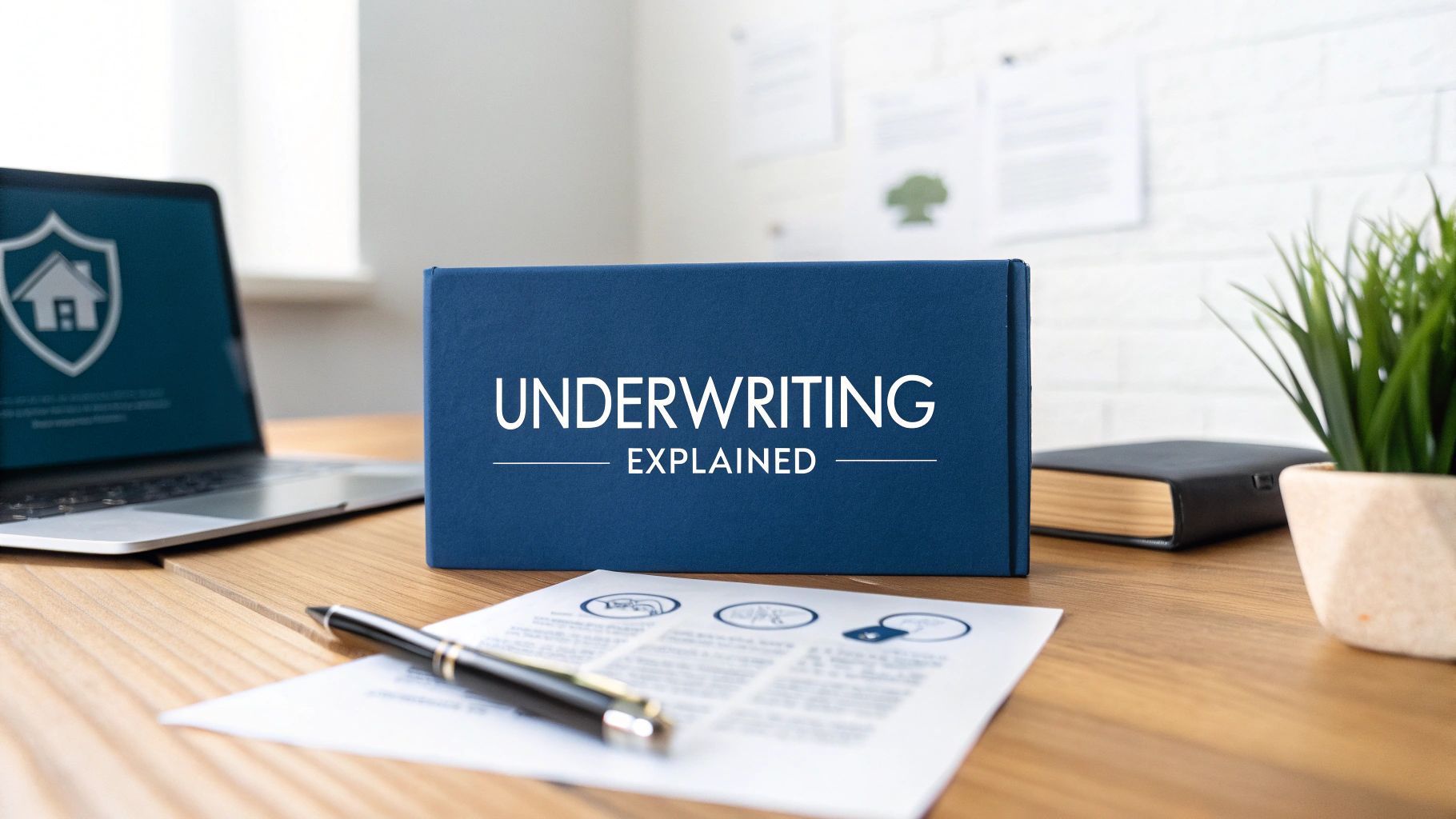UK Insurance for Self Employed People
Taking the plunge into self-employment is a huge step. You’re swapping the safety of a regular payslip for the freedom to be your own boss and that comes with its own set of responsibilities. A massive part of this new world is building your own safety net and the absolute cornerstone of that is the right insurance for self employed professionals. This isn't just another line item on your expenses; it's a vital tool for managing risk and protecting everything you're working to build.
Why Insurance Is Your Business Safety Net

When you're your own boss you wear every hat – CEO, head of sales and crucially chief risk officer. Without a big company's legal and financial protection behind you, you’re personally exposed to every hiccup from client disputes and professional mistakes to accidents and unexpected illness.
Think of insurance as the scaffolding around your business. You don't always notice it day-to-day but it’s there to stop a small problem from bringing the whole thing crashing down.
For example, a client could trip over a cable in your home office leading to a public liability claim. Or a piece of advice you gave in good faith could cause a financial loss for your client, sparking a professional indemnity lawsuit. These aren't just far-fetched scenarios; they are real-world risks that can quickly spiral into eye-watering legal fees and damages.
The True Cost of Going Unprotected
It’s easy to underestimate these risks, especially when you’re starting out and trying to keep costs down. Many view insurance as an expense to avoid rather than an investment in their own stability which has created a massive protection gap across the UK.
Shockingly, recent data shows that around 44% of small businesses and sole traders operate without any form of insurance . That's over 2.1 million companies left completely vulnerable. Even for those who have some cover an estimated 80% might be underinsured leaving them dangerously exposed when things go wrong.
Insurance for the self-employed isn't about planning for failure. It's about building a resilient foundation that gives you the confidence to take calculated risks, chase ambitious goals and run your business knowing you're protected from the unpredictable.
Building a Foundation for Longevity
At the end of the day, managing your risks is just as important as landing your next client. Without that safety net a single unfortunate event could threaten not just your business but your personal savings and your family's financial security too. The small, regular cost of an insurance premium is a manageable price to pay for genuine peace of mind and long-term viability.
For anyone working for themselves, building this strong foundation is absolutely key to business longevity. You can find additional insights for freelance professionals who are navigating this journey.
Understanding Your Core Business Insurance Options
Diving into the world of business insurance can feel like trying to read a foreign language. With so many policies and so much jargon, it’s easy to feel a bit lost. Let's cut through the noise and focus on the three foundational types of cover every self-employed professional in the UK should get to grips with.
Think of these policies less like complex legal documents and more like specialised tools in your business toolkit. A builder wouldn't use a hammer to saw wood and you shouldn't use the wrong insurance for the risks you face. Each one is designed to shield your business from a specific kind of disaster.

The image above gives you a clear snapshot of the main types of cover you’ll come across, showing how each one tackles a different area of risk.
To make things even clearer, here’s a quick breakdown of the most common policies, what they do and who really needs them.
Core Business Insurance for the Self Employed
| Insurance Type | What It Covers | Who Needs It |
|---|---|---|
| Public Liability | Injury to a third party or damage to their property caused by your business activities. | Anyone who interacts with the public or visits client sites (e.g., consultants, tradespeople, photographers). |
| Professional Indemnity | Financial loss a client suffers due to your negligent advice, services or designs. | Professionals who provide advice or services (e.g., IT consultants, designers, accountants, marketers). |
| Employers' Liability | Illness or injury claims made by an employee resulting from their work for you. | Any business that hires staff, including part-time, temporary or contract workers. It's a legal must. |
This table should help you quickly identify where your business fits. Now, let’s dig a little deeper into what each of these means for you in the real world.
H3: Public Liability: Your Shield Against Accidents
Public Liability insurance is probably the first policy most self-employed people think of. It’s your safety net if a member of the public—a client, a customer or even a random passer-by—gets injured or their property is damaged because of your work.
Picture this: you're a freelance photographer on a shoot and a client trips over your camera bag breaking their wrist. Without public liability cover you'd be on the hook for their medical bills, lost earnings and any legal fees. That could easily spiral into thousands of pounds.
This policy is your financial shield against those unpredictable accidents. It's absolutely vital for anyone who has face-to-face contact with the public or works on-site at a client's property.
H3: Professional Indemnity: Protecting Your Expertise
While public liability covers physical slip-ups, Professional Indemnity insurance is all about protecting your professional reputation and know-how. It steps in if a client claims they've lost money because of negligent advice, services or designs you provided.
Think about a freelance IT consultant whose software recommendation fails spectacularly, costing the client a fortune. Or a marketing strategist whose campaign advice leads to a major dip in sales. In scenarios like these, professional indemnity insurance covers your legal defence costs and any compensation you might have to pay.
This type of insurance is a must-have for consultants, designers, accountants and anyone else who trades on their specialist advice. It really highlights how important it is to keep solid records of your work and client communications as these claims often come down to proving you met the standards of your profession.
Insurers have to investigate these claims thoroughly, which is another reason why maintaining robust business practices is so important. You can find more tips on strengthening your operations in our other articles about running a modern business.
H3: Employers' Liability: A Legal Necessity
The moment your self-employed venture grows and you hire someone—even just a temporary or part-time helper— Employers’ Liability insurance becomes a legal requirement in the UK. This policy protects you if an employee gets sick or is injured as a direct result of the work they do for you.
For example, if the barista at your pop-up coffee stand burns themselves on faulty equipment, employers’ liability would cover their compensation claim. The same goes for a part-time assistant who develops a repetitive strain injury from tasks you've set them.
The legal minimum for this cover is £5 million and the Health and Safety Executive (HSE) can hit you with massive daily fines for not having it. This one isn't optional; it's a clear-cut duty to protect your people.
Right, let's talk about protecting the most valuable asset in your business. It's not your laptop, your van or your tools. It's you.
When you're self-employed you're the engine of the entire operation. If that engine breaks down, everything grinds to a halt. Unlike being employed, there’s no sick pay to fall back on, no company benefits package to soften the blow. An unexpected illness or injury can turn into a full-blown financial crisis in a shockingly short amount of time.
That's why we need to shift our focus from just insuring your business to protecting your income and your family's future. This isn't a 'nice-to-have'; it's fundamental.
Income Protection: The Stand-In for Your Salary
Imagine you're a freelance graphic designer and you break your wrist. You’re out of action for three months but the mortgage, council tax and food bills certainly don't take a break. This is exactly where Income Protection insurance steps in.
Think of it as hiring a substitute who covers your financial commitments while you can't work. This policy is designed to replace a huge chunk of your monthly income if an illness or injury stops you from doing your job. It pays out a regular, tax-free sum, keeping your household afloat until you’re back on your feet.
For anyone who's self-employed, this is arguably the most critical insurance you can have. It provides a reliable stream of cash when you need it most, stopping you from draining your business accounts or personal savings just to get by. The payments continue until you can work again, reach retirement age or the policy term ends, whichever comes first.
Critical Illness Cover: A Lump Sum for Life's Biggest Curveballs
While Income Protection provides a steady monthly lifeline, Critical Illness Cover works differently. This policy pays out a one-off, tax-free lump sum if you're diagnosed with a specific, serious illness listed in the policy—things like some forms of cancer, a heart attack or a stroke.
The whole point of this lump sum is to give you immediate financial breathing room during a major health crisis. You can use that money for whatever you need most:
- Covering medical costs: Maybe you need private treatment, specialist consultations or to make modifications to your home.
- Paying off debts: Many people use the payout to clear their mortgage or other big loans, instantly reducing financial pressure.
- Replacing lost income: It can act as a buffer to support your family while you focus completely on getting better.
- Funding life adjustments: The money can give you the freedom to step back from work permanently or make other big lifestyle changes.
It's really important to get your head around the fact that this cover only pays out for the specific conditions defined in your policy documents. It's not a catch-all for any illness that stops you from working but it delivers a powerful financial punch for the most severe health emergencies.
The stark reality is that a health crisis hits the self-employed harder than most. New data has revealed that more than one in three self-employed professionals in the UK are likely to face a health condition serious enough to jeopardise their ability to work, with potentially catastrophic results for their finances. You can learn more about the financial risks of health crises for the self-employed on wecovr.com.
Private Health Insurance: Getting Back to Business, Faster
Finally, let's look at Private Health Insurance , often called private medical insurance (PMI). We're incredibly lucky to have the NHS in the UK but we all know that long waiting lists for certain treatments can be a massive problem—especially when you run your own business. Time spent waiting is time you're not earning.
Private Health Insurance is your ticket to faster access. It gets you seen by specialists, diagnosed and treated in private hospitals much more quickly. For a sole trader, a six-month wait for a knee operation could be devastating. With private cover you could potentially have the surgery within weeks. It's all about reducing the time you spend out of action and getting you back to your business sooner.
By building this personal financial safety net you ensure that no matter what life throws at you, your personal finances are secure. That leaves you free to focus on what really matters—your recovery and your business.
How Insurance Premiums Are Really Calculated

Trying to understand what goes into your insurance premium can feel a bit like cracking a code. Insurers aren't just plucking numbers out of thin air; they're carrying out a detailed risk assessment that’s unique to you and your business. The final figure you’re quoted is a direct reflection of the level of risk they believe you represent.
Think of it this way: a self-employed stunt performer is going to face far more physical risks than a freelance copywriter working from home. It makes sense, then, that their insurance premiums will be worlds apart. This core principle of risk assessment is what drives the whole calculation.
Your premium is tailored to your specific circumstances, ensuring the price you pay matches your potential for making a claim. So, let's break down the key ingredients insurers mix together to come up with the cost of your cover.
Key Factors That Shape Your Premium
Insurers weigh up several variables to calculate your premium for any type of insurance for self employed people. While the specifics can vary between providers, the fundamental elements pretty much stay the same across the industry.
Here are the most common factors that will influence how much you pay:
- Your Profession: This is the big one. A self-employed builder working with heavy machinery poses a much higher risk of public liability claims than a graphic designer.
- Business Turnover: A higher turnover can sometimes suggest a larger scale of operations and more client interactions which can nudge the risk factor up.
- Level of Cover: It stands to reason that the more protection you need (say, a £5 million public liability limit versus £1 million ) the higher the premium will be.
- Your Claims History: A track record of making claims suggests you're more likely to claim again in the future which will push your costs up. Building a solid no-claims history is a powerful way to bring your premium down over time.
This careful calculation ensures the price you pay is a fair reflection of the protection you're getting. But there’s another, more hidden factor that affects everyone's costs.
The Hidden Cost of Insurance Fraud
The whole insurance system is built on a foundation of trust and honesty. Unfortunately, insurance fraud—ranging from organised criminal rings to small, opportunistic exaggerations on a genuine claim—chips away at that trust. When a policyholder inflates the value of a stolen laptop or falsely claims for an injury, it creates a ripple effect that touches every honest customer.
Insurance fraud is not a victimless crime. The cost of investigating and paying out dishonest claims is ultimately passed on to all policyholders in the form of higher premiums. It forces insurers to invest heavily in verification to make sure every claim is provable.
This need for proof means insurers have to spend a significant amount on investigators, data analysis and legal teams just to weed out fraudulent activity. This operational overhead is a direct cost that gets factored into the premium calculations for everyone. In essence, honest self-employed professionals end up subsidising the dishonest actions of a few.
Taking Control of Your Insurance Costs
While you can’t control the impact of industry-wide fraud you can take several positive steps to manage your own premiums responsibly. The goal is to present yourself to insurers as a low-risk, trustworthy client.
Here are a few actionable tips:
- Be Accurate and Honest: From the get-go, provide a precise and truthful description of your business activities. Misrepresenting what you do could invalidate your policy right when you need it most.
- Choose the Right Cover Level: Don't over-insure or under-insure. Take a realistic look at your contractual requirements and genuine risks to select a level of cover that’s right for your business.
- Implement Strong Risk Management: Show insurers you’re proactive. Having clear health and safety procedures or robust client contracts can demonstrate that you take risk seriously.
- Build a No-Claims Bonus: The longer you go without making a claim, the lower your premiums will become. This is the most effective way to secure cheaper insurance over the long term.
By taking these steps you not only make sure you're paying a fair price but also contribute to a more sustainable and trustworthy insurance market for all self-employed professionals.
The True Cost of Being Uninsured or Underinsured
Choosing to go it alone without the right insurance for self employed professionals isn’t just a calculated risk—it’s a massive gamble with potentially life-altering consequences. It’s easy to see an annual premium as just another expense to trim but that view completely misses the devastating financial and emotional chaos that a single mishap can unleash.
When things go wrong they can go spectacularly wrong. Take a simple public liability incident like a client tripping over a loose cable in your home office. It sounds minor but it can quickly spiral into a six-figure legal nightmare involving compensation for injury, loss of earnings and eye-watering legal fees.
Likewise, a professional mistake such as giving advice that causes a client a financial loss could trigger a professional indemnity claim big enough to bankrupt your entire business. Without insurance you’re left to face these colossal costs on your own, putting your business, your home and your family's financial security on the line.
The Ripple Effect of Insurance Fraud
It's not just the uninsured who face high costs. Insurance fraud creates a hidden tax that hits every single policyholder in the UK. When insurers pay out on fraudulent or dishonestly exaggerated claims those losses don't just disappear. They get absorbed by the industry and are passed on to all customers in the form of higher premiums.
This forces insurers to invest heavily in robust verification and investigation processes. The work required to ensure every claim is provable and legitimate adds significant operational costs which inevitably get baked into the price of every policy.
The cost of insurance is a small, manageable investment compared to the life-altering financial and emotional toll of facing a disaster alone. Protecting your livelihood is not an area where you can afford to cut corners.
The sheer scale of this problem is staggering. According to the Association of British Insurers (ABI), undetected general insurance fraud is estimated to cost the industry over £2 billion a year . This adds an average of £50 to the annual insurance bill for every UK policyholder. In 2022 alone, insurers sniffed out 72,600 dishonest claims valued at a colossal £1.1 billion .
Ensuring Your Claim Is Provable
The prevalence of fraud highlights why provability is absolutely essential when you make a genuine claim. Insurers are, quite rightly, cautious and will scrutinise claims to make sure they’re legitimate. This is where meticulous record-keeping becomes your greatest ally.
For a claim to succeed you need to provide clear evidence that backs up your loss. This could include:
- Photographs and Videos: Visual proof of damaged property or the scene of an accident is invaluable.
- Receipts and Invoices: Documents proving the value of items that were lost, stolen or damaged.
- Client Communications: A clear paper trail of emails, contracts and project briefs can be crucial in professional indemnity disputes.
- Incident Reports: A detailed, contemporary account of what happened including dates, times and any witnesses.
Failing to provide solid proof is one of the main reasons claims get delayed or denied. To learn more, check out our guide on why your insurance company might refuse to pay a claim and what you can do about it. Being prepared doesn’t just speed up the process; it strengthens your position immensely.
Ultimately, the small annual cost of an insurance policy is a predictable business expense. The potential cost of facing a claim while uninsured, however, is an unpredictable—and potentially unlimited—liability. Think of it as a foundational investment in your business’s resilience and your own peace of mind.
Your National Insurance Responsibilities Explained
When you’re self-employed, sorting out commercial insurance is just one piece of the puzzle. Here in the UK you also have legal financial duties to take care of and one of the most important is paying National Insurance (NI).
Think of NI as the state-backed safety net that runs alongside your private insurance. It’s the system that builds up your entitlement to crucial state benefits like the State Pension or Maternity Allowance, giving you another layer of long-term financial protection.
For sole traders this is all handled through your annual Self Assessment tax return. Unlike an employee who pays NI weekly or monthly, yours is calculated based on your yearly profits. Getting your head around this is a fundamental part of managing your business finances responsibly.
How Class 2 and Class 4 NI Contributions Work
The system for the self-employed mainly boils down to two types of contributions: Class 2 and Class 4 . The amount you pay depends on how much profit your business makes each tax year. Staying on top of this isn't just about ticking a legal box; it’s about making sure your NI record is complete, which safeguards your access to state support down the line.
For more in-depth support on navigating all your regulatory duties, you might find this ultimate guide to compliance management solutions useful.
The government updates the thresholds and rates every year so it’s vital to know the current figures. For the 2024 to 2025 tax year, the rules are:
- If your profits are £6,725 or more you're treated as having made your Class 2 contributions. This is what protects your NI record for state benefits.
- If your profits climb above £12,570 you’ll also need to pay Class 4 contributions. This is charged at 6% on profits between £12,570 and £50,270 and 2% on any profits above that.
You can always find the latest details on the current self-employed NI rates on GOV.UK.
A complete National Insurance record is your key to unlocking future state benefits. Failing to meet your obligations can leave significant gaps, potentially reducing the State Pension you receive in retirement or affecting your eligibility for other support when you might need it most.
Making these contributions is simply part of the deal when you work for yourself. By understanding your responsibilities and paying the right amount based on your profits, you ensure you’re compliant and building a solid foundation for your own financial wellbeing.
Got Questions About Self-Employed Insurance?
Stepping into the world of self-employment is liberating but figuring out the insurance side of things can feel like a minefield. You’re not alone. Lots of freelancers and sole traders have the same questions so let’s clear them up.
Think of this as your no-nonsense cheat sheet for the common queries that pop up. We'll tackle what you actually need, what it might cost and how it all fits into your business finances.
Do I Legally Have to Get Insurance?
For most sole traders in the UK the short answer is no—business insurance isn't a legal must-have. The one major exception is Employers' Liability insurance . The second you hire your first employee, even on a casual or temporary basis, this becomes a legal requirement.
But here’s the thing: while the law might not force you, your clients often will. Many companies won't even consider signing a contract unless you have Public Liability or Professional Indemnity cover in place. So, while it's not a legal obligation, working without it is a huge financial gamble.
What’s the Damage? How Much Does It Cost?
This is the classic "how long is a piece of string?" question. The cost of your insurance is completely unique to you and your business. The price tag depends on things like your profession, your annual turnover and the level of cover you choose. A freelance writer tapping away at a keyboard from home will pay a lot less than a self-employed builder on a busy construction site.
To give you a rough idea, a basic Public Liability policy for a lower-risk profession can start from under £10 per month . The only way to get a real number is to get quotes tailored specifically to what you do.
Cost is always a factor but don't fall into the trap of buying the cheapest policy you can find. The real value is knowing your cover will actually protect you when you need it. A cheap policy with big gaps is a false economy that could leave you dangerously exposed.
Can I Put My Insurance Premiums Down as a Business Expense?
Absolutely. In the UK any insurance policy taken out purely to protect your business is considered an allowable expense. This means you can deduct the cost from your profits when you file your Self Assessment tax return which neatly lowers your overall tax bill.
This typically includes:
- Public Liability
- Professional Indemnity
- Employers' Liability
Just be mindful that policies for your personal protection like income protection or private health insurance generally don't count as business expenses. For a deeper dive, our full list of frequently asked questions has more detailed guidance.
What's the Difference Between Public Liability and Professional Indemnity?
This is a really common point of confusion but the distinction is pretty simple when you break it down.
Public Liability is all about physical incidents. It covers claims made against you for injuring someone or damaging their property while you're working. Think of a client tripping over your toolbox and breaking their arm—that's a Public Liability issue.
Professional Indemnity , on the other hand, is about the financial fallout from your professional services or advice. It protects you if a client claims your work was negligent and caused them to lose money. For example, if a business consultant's strategy backfired and cost their client a fortune, that would be a Professional Indemnity claim.
At Proova , we believe in making the claims process transparent and secure, ensuring genuine claims are handled efficiently. Find out how we can help protect your assets by visiting https://www.proova.com.












